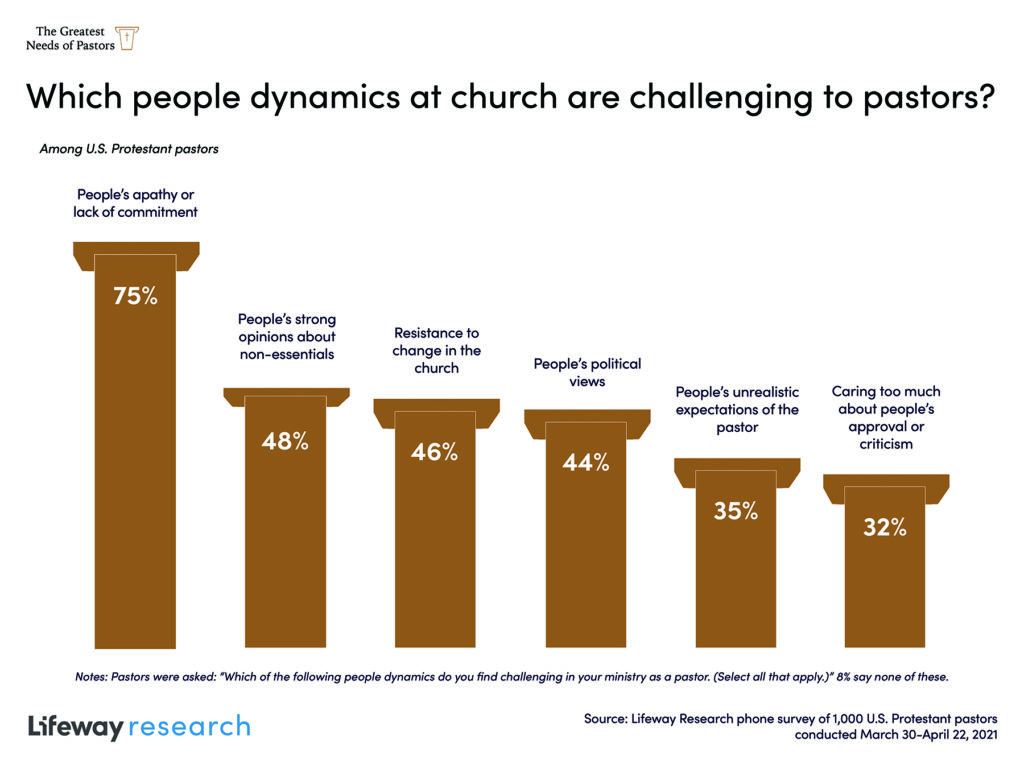Pastors often deal with churchgoers with strong opinions, but they’re much more concerned about the people in their congregations who don’t seem to care much at all.
In the final release from Lifeway Research’s 2022 Greatest Needs of Pastors study, most pastors say the primary people dynamic challenge they face in their churches is people’s apathy or lack of commitment.
“Many people can be a member of a church, but not participate in the work of the church,” said Scott McConnell, executive director of Lifeway Research. “Pastors see the potential of mobilizing everyone in the church to minister to others in the church and in their community.”
People Dynamic Challenges
For the 2022 Greatest Needs of Pastors study, Lifeway Research interviewed 200 U.S. Protestant pastors who identified 44 issues related to their role and then surveyed 1,000 additional pastors to determine which of these needs was most prominent among pastors. The nearly four dozen needs were divided into seven categories: ministry difficulties, spiritual needs, skill development, self-care, personal life, mental health and people dynamics.
Among these categories, 22% of pastors say people dynamics in their congregations are the most challenging or require the most attention today. Skill development (23%) is the only category more pastors identify as their area of greatest need.
Six of the 44 total needs are classified as people dynamics, but pastors say apathy is by far the most pressing issue in this category. Three in 4 U.S. Protestant pastors (75%) say apathy or lack of commitment is a people dynamic they find challenging in their congregations. Among all 44 issues pastors identified, developing leaders and volunteers and fostering connections with unchurched people are the only issues more pastors say they recognize as a need.
Close to half of pastors say they find it challenging in their ministries to deal with people’s strong opinions about non-essentials (48%), resistance to change in the church (46%) and people’s political views (44%). Around a third point to people’s unrealistic expectations of the pastor (35%) and caring too much about people’s approval or criticism (32%). Fewer than 1 in 10 (8%) say none of these are challenging for them as a pastor.

“Congregations are filled with many opinions,” said Scott McConnell, executive director of Lifeway Research. “It is not easy to bring a congregation’s focus to a few things to do together that matter. People’s obsession with non-essentials, politics and a dislike for change all hamper a pastor’s ability to provide leadership.”
Young pastors, those 18-44, are frequently among the most likely to say they face challenging people dynamics at their church, including people’s strong opinions about non-essentials (60%), people’s political views (55%), resistance to change (52%), people’s unrealistic expectations of the pastor (46%) and caring too much about people’s approval or criticism (45%).
White pastors are among those most likely to say they deal with strong opinions about non-essentials (50%), challenging political views (47%) and caring too much about people’s approval or criticism (33%).
Pastors in different denominational families are likely to struggle with different people dynamics in their congregations. Baptist (79%), non-denominational (78%) and Pentecostal pastors (77%) are among the most likely to say they find people’s apathy challenging, while Lutheran (40%) and Methodist pastors (38%) are among the most likely to point to caring too much about people’s approval or criticism as a ministry challenge.

